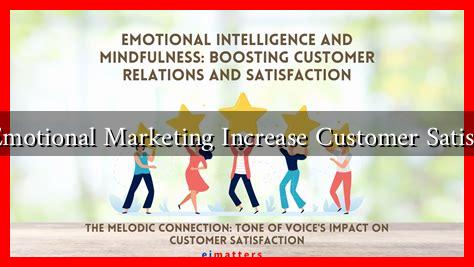-
Table of Contents
- Does Emotional Marketing Increase Customer Satisfaction?
- Understanding Emotional Marketing
- The Impact of Emotions on Consumer Behavior
- Case Studies: Brands That Excel in Emotional Marketing
- 1. Coca-Cola: The Power of Happiness
- 2. Nike: Inspiring Empowerment
- 3. Dove: Celebrating Real Beauty
- Statistics Supporting Emotional Marketing
- Conclusion: The Power of Emotional Marketing
Does Emotional Marketing Increase Customer Satisfaction?
In today’s competitive marketplace, businesses are constantly seeking innovative ways to connect with their customers. One strategy that has gained significant traction is emotional marketing. This approach leverages the power of emotions to create a deeper connection between brands and consumers. But does emotional marketing truly increase customer satisfaction? In this article, we will explore the relationship between emotional marketing and customer satisfaction, supported by examples, case studies, and statistics.
Understanding Emotional Marketing
Emotional marketing is a strategy that aims to evoke specific feelings in consumers to influence their purchasing decisions. By tapping into emotions such as happiness, nostalgia, fear, or empathy, brands can create memorable experiences that resonate with their audience. This approach goes beyond traditional marketing tactics, which often focus solely on product features and benefits.
The Impact of Emotions on Consumer Behavior
Research has shown that emotions play a crucial role in consumer behavior. According to a study by the American Marketing Association, emotional responses to advertisements can significantly impact brand loyalty and purchasing decisions. Here are some key findings:
- Emotional ads are more likely to be shared on social media, increasing brand visibility.
- Consumers are more likely to remember brands that evoke strong emotions.
- Emotional connections can lead to higher customer retention rates.
Case Studies: Brands That Excel in Emotional Marketing
Several brands have successfully implemented emotional marketing strategies, resulting in increased customer satisfaction and loyalty. Here are a few notable examples:
1. Coca-Cola: The Power of Happiness
Coca-Cola’s “Open Happiness” campaign is a prime example of emotional marketing. By associating their product with feelings of joy and togetherness, Coca-Cola has created a strong emotional bond with consumers. The campaign not only increased sales but also enhanced customer satisfaction, as consumers felt a sense of connection with the brand.
2. Nike: Inspiring Empowerment
Nike’s “Just Do It” campaign focuses on empowerment and motivation. By showcasing athletes overcoming challenges, Nike taps into feelings of inspiration and determination. This emotional appeal has fostered a loyal customer base that identifies with the brand’s values, leading to higher satisfaction levels.
3. Dove: Celebrating Real Beauty
Dove’s “Real Beauty” campaign challenges traditional beauty standards and promotes self-acceptance. By addressing societal issues and encouraging women to embrace their natural beauty, Dove has built a strong emotional connection with its audience. This approach has resulted in increased customer satisfaction and brand loyalty.
Statistics Supporting Emotional Marketing
Several studies highlight the effectiveness of emotional marketing in enhancing customer satisfaction:
- A study by Harvard Business Review found that emotionally connected customers are more than twice as valuable as highly satisfied customers.
- According to a report by Forbes, brands that prioritize emotional connections see a 23% increase in sales compared to those that do not.
- Research from Gartner indicates that 70% of buying experiences are based on how the customer feels they are being treated.
Conclusion: The Power of Emotional Marketing
Emotional marketing is not just a trend; it is a powerful strategy that can significantly enhance customer satisfaction. By creating emotional connections with consumers, brands can foster loyalty, increase retention rates, and ultimately drive sales. The examples and statistics presented in this article demonstrate that when brands tap into the emotions of their audience, they can create memorable experiences that resonate long after the initial interaction.
In summary, emotional marketing is a vital tool for businesses looking to improve customer satisfaction. By understanding and leveraging the emotional triggers that influence consumer behavior, brands can build lasting relationships with their customers, leading to a more successful and sustainable business model.

